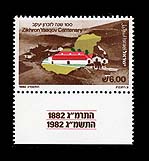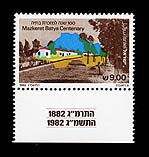|
Zikhron Yaaqov was one of the first colonies in Eretz Israel and the first on the mountains of the Carmel on the borders of Samaria. It was founded by members of Hovevei Zion from Roumania who took their lives in their hands to settle in their desolate homeland, then under Turkish rule. After climbing up a winding mountain path they reached the deserted rock-covered peak and there they decided to set up home, determined to restore the soil to life and force it to provide them with a living. Although they had no farming experience whatsoever, they learned through trial and error, and soon the bare rocks were covered in vineyards and there they built wine cellars where they pressed the grapes to produce the famous "Carmel Wines" which they exported to Jewish communities all over the world.
Zikhron Yaaqov was founded at the end of 1882 and was originally called by the Arabic name of "Zammarin". Following the visit of Baron Benjamin de Rothschild and in appreciation of the generous assistance proffered them, they renamed their colony "Zikhron Yaaqov" (Jacob's Memorial) after his father, Jacob de Rothschild. The colony's initial years were marked by numerous difficulties. It lay isolated and alone at the end of a boulder-strewn path. The settlers had to labour long and hard in order to prepare the soil for agriculture. But there was one outstanding advantage possessed by the colony and that was the glorious mountain scenery and its invigorating, healthy climate which the settlers enjoyed to the full.
From time to time disputes broke out between the settlers and the Baron's officials, but they were all settled in the end. In due course a young generation took over from the original settlers - strong and experienced, they lovingly developed and extended their settlement.
A journalist reported on life in the colony in 1907 in the following terms: "Harvest time has arrived and life has become hectic. The carts laden with barrels of grapes, rattle their way along. There is a continuous coming and going - a kind of perpetual motion. Everyone is hard at work, busy all day long - there is no time to rest. One task follows hard on the heels of the other - hardly is the threshing over than it is time for the grapes to be harvested, while at the same time the almonds have to be plucked and olive-picking time is close at hand. But the farmers don't complain about the hard work - they rejoice in it, knowing that only through toil will they earn their daily bread".
In the year 1902, Zikhron Yaaqov was the site ot a gathering of representatives of the Jewish settlements in Eretz Israel when the first attempts at setting up an organized body were made. It was at that assembly that the Jewish Teachers' Association was founded.
One of the children of the original settlers was the famous botanist and agronomist Aaaron Aaronson, the discoverer of the Wild Emmer Wheat. In the heart of the colony there stands a house named in his honour. The house served as the headquarters of the NILI - a group of patriots who, during the first World War, supplied the British with information about the Turkish forces then occupying the country.
In the course of time, two additional settlements were founded nearby - Shefeya (Children's Village) and Bat-Shlomo.
After the establishment of the State, Zikhron grew and its population increased. Different institutions set up their offices there and the place became a centre for the surrounding communities. A memorial to the first settlers and founders was set up and later on, Baron de Rothschild, the "father of the colony", and his wife were re-buried on a nearby hill-top now known as "Ramat Ha-Nadiv" (the Benefactor's Height).
Mazkeret Batya, a pioneering settlement in Judea, near Rehovot, was named after Batya de Rothschild, the mother of the famous Baron de Rothschild, the father of Jewish agricultural settlement in the Holy Land. It was founded at the end of 1883 by a group of Russian Jews, members of Hovevei Zion, who came to the country full of enthusiasm, determined to make a home in their ancient homeland.
In the beginning, they called their settlement Akron, a town famous from Biblical times, which, they believed, replaced the nearby Arab village of A'akar - to-day Qiryat Akron.
In spite of all the physical difficulties, they persevered and transformed their settlement into a village surrounded by green fields and orchards.
Baron de Rothschild visited the settlement in 1887 and was enthusiastic over what he saw. A journalist reporting on the visit wrote "As he arrived, the settlers greeted him, bearing Scrolls of the Law in their hands and greeted him with shouts of joy. "The Prince" went out into the fields and saw them all covered in produce and a beautiful sight to behold. On his return from the fields he visited the settlers' homes and was overjoyed at the sight of their customs and clothing which were true to the traditions of our ancient homeland...and the settlement became a sacred remembrance inscribed on his heart."
For many years, Mazkeret Batya remained a typical settlement of farmers earning a modest living by the sweat of their brow in an environment filled with love of the homeland and the traditions of their forefathers. But following the establishment of the Jewish State, new settlers came to the area, and as multi-storeyed buildings went up, the modest, isolated village gradually grew into an urban suburb surrounded on all sides by new settlements.


